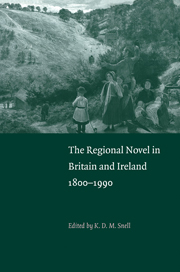Book contents
- Frontmatter
- Contents
- Preface and acknowledgements
- 1 The regional novel: themes for interdisciplinary research
- 2 Regionalism and nationalism: Maria Edgeworth, Walter Scott and the definition of Britishness
- 3 The deep romance of Manchester: Gaskell's ‘Mary Barton’
- 4 Geographies of Hardy's Wessex
- 5 Gender and Cornwall: Charles Kingsley to Daphne du Maurier
- 6 James Joyce and mythic realism
- 7 Cookson, Chaplin and Common: three northern writers in 1951
- 8 Emyr Humphreys: regional novelist?
- 9 Scotland and the regional novel
- 10 Mapping the modern city: Alan Sillitoe's Nottingham novels
- Index
8 - Emyr Humphreys: regional novelist?
Published online by Cambridge University Press: 18 December 2009
- Frontmatter
- Contents
- Preface and acknowledgements
- 1 The regional novel: themes for interdisciplinary research
- 2 Regionalism and nationalism: Maria Edgeworth, Walter Scott and the definition of Britishness
- 3 The deep romance of Manchester: Gaskell's ‘Mary Barton’
- 4 Geographies of Hardy's Wessex
- 5 Gender and Cornwall: Charles Kingsley to Daphne du Maurier
- 6 James Joyce and mythic realism
- 7 Cookson, Chaplin and Common: three northern writers in 1951
- 8 Emyr Humphreys: regional novelist?
- 9 Scotland and the regional novel
- 10 Mapping the modern city: Alan Sillitoe's Nottingham novels
- Index
Summary
‘Where were you when you were fifteen?’
The question puzzled me. Why should he ask and damn it why should he ask. Fifteen, where was I?…
‘In a school’, I said, ‘In North-East Wales.’
Lars laughed but I didn't mean it as a joke.
‘That's funny the way you divide up Wales. Does anybody else do it but you?’
Emyr Humphreys's lifelong work as a novelist has largely consisted of a resolute expansion of this unintentional geopolitical ‘joke’, at the expense of those of his readers who, like Lars, grow increasingly incredulous. How, they object, can an area of Britain that is itself routinely described and treated as a ‘region’ possibly claim to have regions of its own? Isn't the term ‘region’ (generously upgraded on sensitive occasions to ‘principality’) good enough for it? Doesn't Wales realise that to be recognised as a region is in itself a considerable achievement, a significant concession granted by a notoriously centralist British state? The splitting of the political atom, the supposedly irreducible unit of the British nation-state, has caused trouble enough in itself. It really is preposterous to hear that Wales, the new irreducible unit, the veritable quark of the British political system, now regards itself as internally divided, and diverse.
There are some who will no doubt feel that such remarks are perfectly reasonable, and prominent among them will presumably be those who indignantly regard the word ‘region’ as being an innocent geographical expression, totally above political suspicion.
- Type
- Chapter
- Information
- The Regional Novel in Britain and Ireland1800–1990, pp. 201 - 220Publisher: Cambridge University PressPrint publication year: 1998
- 1
- Cited by



